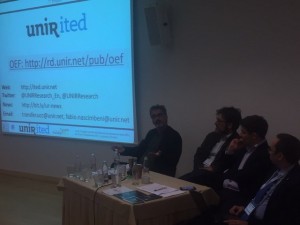Open Educators Factory participates in 2nd World OER Congress
On the 18-20th September 2017, UNESCO and the Slovenian Ministry of Education, Sciencie and Sport brought together 550 participants from 111 contries for the 2nd World OER Congress, which marked the 15th anniversary of meeting at UNESCO where the «OER» (Open Educational Resources) term was coined in 2002. The Congress aimed at moving from commitment to action, and resulted in the production of the Ljubljana OER Action Plan, containing 41 recommendations to mainstream OER and Open Education, with a view of contributing to achieving the 2030 UNESCO Sustainable Development Goal 4 on «Quality and lifelong education».
The Congress was organized along a Ministerial Meeting, which was surrounded by a number of Satellite Events, where the most interesting developments in the fild of OER and Open Education were discussed. The Open Educators Factory (OEF) project, co-directed by Daniel Burgos and Fabio Nascimbeni from Universidad Internacional de La Rioja (UNIR), had the honor of organizing one of these Satellite events, aiming to discuss the importance of Open Educators in the Open Education and OER movement. During this event, which counted with panelists sush as the OER Chairlonders Colin de la Higuera from France and Tel Amiel from Brazil and the quality expert Anthony Camilleri from Slovenia, a number of strategies to empower educators towards openness were debated, concluding that Open Educators capacity development mus be attentive to teacher’s workload, cultural background and level of openness fluency. Participants appreciated the fact that the OEF platform can provide different entry points to openness, in line with these recommendations. During the event, the new Research Institute for Innovation & Technology in Education (iTED) of the Universidad Internacional de La Rioja (UNIR) was presented.

Finally, we are glad to see that educators were recognised as cornerstones for OER and Open Education developments in the final Congress Declaration, whose actions include the provision of capacity building for teachers and teacher trainers, among other stakeholders, and the need to empower educators and learners to develop gender-sensitive, culturally and linguistically relevant OER appropriate to local cultures.
As a conclusion, we left the Congress with the idea that Open Educators Factory (OEF) is in the position to contribute to these important priorities, and ready to do so!
